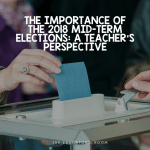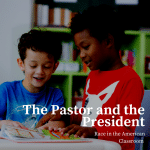I make my living by teaching politics to high school seniors and college students.
I am not a “read-the-textbook” kind of teacher. I want my students to watch the news. I want them to read political biographies. I want them to watch the complete seven seasons of The West Wing.
Of course, few of them read beyond the headlines and, to my dismay, they are not rushing to Barnes and Noble after school to mentally digest Robert Caro’s latest 700-page tome about Lyndon Johnson.
What bothers me is not their indifference to the news or their lack of verve for long biographies. What is shocking is they do not share my deep and passionate love of The West Wing. [fusion_builder_container hundred_percent=”yes” overflow=”visible”][fusion_builder_row][fusion_builder_column type=”1_1″ background_position=”left top” background_color=”” border_size=”” border_color=”” border_style=”solid” spacing=”yes” background_image=”” background_repeat=”no-repeat” padding=”” margin_top=”0px” margin_bottom=”0px” class=”” id=”” animation_type=”” animation_speed=”0.3″ animation_direction=”left” hide_on_mobile=”no” center_content=”no” min_height=”none”][bctt tweet=”Extolling the virtues of Aaron Sorkin’s political drama is a central article of my teaching repertoire that, as the years have gone by, has increasingly fallen on deaf ears.”]
Almost a decade after the last episode aired I still miss the grandiloquence of President Bartlett, the hyperkinetic charm of Joshua Lyman, the psychological complexity of Toby Ziegler, and the old soul of Leo McGarry. I watch old episodes and the serpentine journey through the bowels of the White House still engrosses me. I enthusiastically encourage my high school and university students to seek these characters on Netflix.
But there’s a problem.
Of late, my students find the optimism of The West Wing to be off-putting and phony. The unabashed patriotism of the characters laced with the over-arching optimism about America’s promise and potential does not come across as particularly realistic or genuine to the students now occupying America’s classroom.
It’s not that they don’t enjoy political thrillers. They are unabashed enthusiasts of House of Cards. They glory in the Machiavellian calculus of Frank Underwood and his wife, Claire. To them, the proper and more realistic bedfellow of politics is not patriotism, empowerment, and optimism, but a menacing and modern manifestation of Thucydides’s famous axiom in the Melian Dialogue that, “the strong do what they can and the weak suffer what they must.”
Does this divergence in our cinematic tastes belie a larger and more significant generational schism about the fundamental nature of political institutions and public life? I am afraid it does.
The West Wing came of age in the afterglow of the 1990’s, an era that experienced unprecedented economic growth and a temporary reprieve from serious geopolitical threats. A president who raised the pulse of the nation’s patriotism by proclaiming, “Never doubt that a small group of thoughtful and committed citizens can change the world,” came across as a vessel of genuine inspiration.
Sadly, today President Bartlett seems utterly ridiculous to students brought up on a steady diet of smugness parading itself as thoughtful commentary. Smugness has become the operational tenor of our culture. After all, my students have grown up in an America humbled in the Middle East, subjected to an endlessly anemic economy, and witnesses to innumerable government and commercial institutional failures.
Unfortunately, there is much to be cynical about in America circa 2015.
Thus, sophisticates and intellectuals of the day often ooze a disdain bordering on conceit for those who deign to embrace an ethic of optimism. This smugness is a bi-partisan affair. My students are generally kind and pleasant people to be around. Yet the tone of the world they inhabit—omnipresent social media and an ideological modern media—informs their impression that those who are usually “in the know” are rarely apostles of humility, much less sunny optimism.
Instead, sophistication is often portrayed as tantamount to cynicism. Dispassion is the disposition of the elite. Denizens of a culture that find it tragically, even comically, naïve to believe in ideals bigger than oneself—national purpose, divine inspiration, or improvement in the landscape of one’s family and community—will naturally be suspicious of leaders who believe in the nobility of politics.
Thomas Jefferson once wrote that, “every difference of opinion is not a difference of principle.” President Obama echoed this sentiment two centuries later when he said, “we can disagree without being disagreeable.” Are Jefferson and Obama also ridiculous in the eyes of my students?
More to the point, am I ridiculous?
Maybe.
[bctt tweet=”My job is to empower and empassion students to lend their voices to the cause of their nation, to convince them that a nation devoted to the propositions of self-government and expansive opportunity is better served by the edifying optimism of The West Wing than the entertaining cynicism of House of Cards.”]
The underlying message of The West Wing is that America is an infinitely improvable nation, that when idealism is fused into the political process we collectively inch closer to the ideals of our Constitution to reach a “perfect union” and the “establishment” of “justice.”
My students certainly relish the sinister passions of Frank Underwood, but they are passions in pursuit of personal gain. A vogue and chic smugness might project an urbane sophistication in the short run, but in the end it will cause the nation to collapse like a house of cards.[/fusion_builder_column][/fusion_builder_row][/fusion_builder_container]





